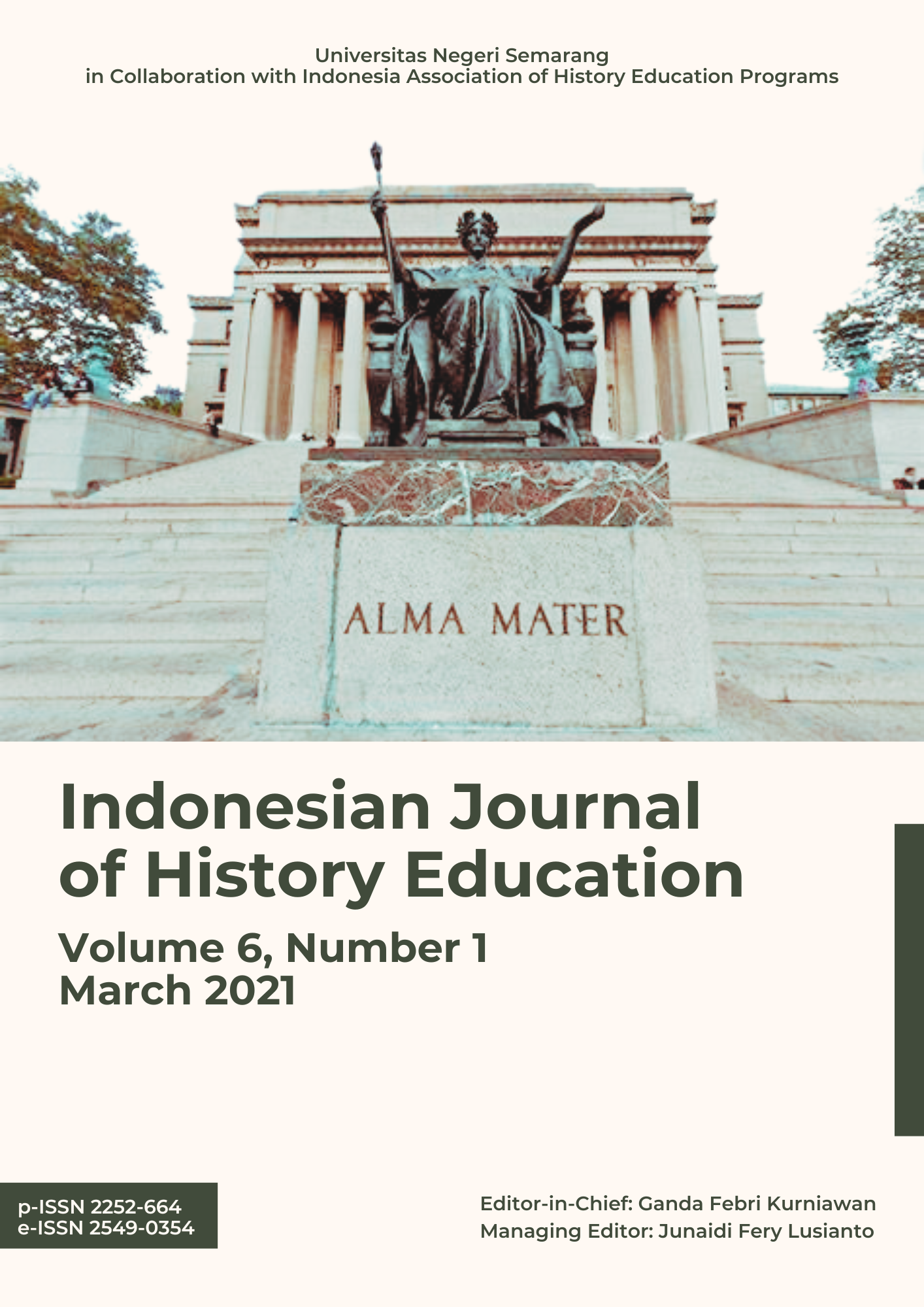Instilling the Value of Local Wisdom in Learning the History of the Subject of Islamic Development in Indonesia in Class X Social Studies Students at SMA Negeri 1 Pamotan
Abstract
Education teaches the understanding of teaching materials and shapes attitudes and the media to preserve the local culture. The cultivation of local wisdom is necessary because students can better understand and love the culture they have. Education teaches the understanding of teaching materials and shapes attitudes and the media to preserve the local culture. The cultivation of local wisdom is necessary because students can better understand and love the culture they have. This research employs a qualitative method with a narrative approach. Informants in this research are history teachers and students of SMA Negeri 1 Pamotan. The techniques for collecting data are observation, interview, and documentation. To test data validity, this research uses data technique triangulation and source triangulation. The data analysis technique is interaction analysis, which consists of data collection, reduction, presentation, and conclusions. The results showed that 1) regarding the cultivation of local wisdom values through historical learning, the teachers only develop their knowledge related to local culture. Local wisdom is given more attention in school activities. 2) The implementation of the values of local wisdom is running well. The values of local wisdom include ethics, aesthetics, religion, and society.
References
Agus, W. (2015). Gunawan, Pendidikan Karakter Berbasis Kearifan Lokal Di Sekolah Konsep, Strategi, dan Implementasi.
Ahmad, T. A. (2011). Peran Wanita dalam Islamisasi Jawa Abad XV. Paramita: Historical Studies Journal, 21(1).
Amin, S. (2010). Pewarisan nilai sejarah lokal melalui pembelajaran sejarah jalur formal dan informal pada siswa sma di Kudus Kulon (Doctoral dissertation, UNS (Sebelas Maret University).
Anni, C. T., & Rifa'i, A. (2009). Psikologi Pendidikan. Semarang.
Atmaja, H. T. (2017). Konstruksi Pembelajaran IPS Berbasis Kebangsaan (Studi Fenomenalogi pada Guru Pendidikan IPS) pada Seminar Tahunan Pendidikan Ilmu-ilmu Sosial. Universitas Negeri Medan.
Azan, R. R. (2013). Upaya Penguatan Karakter Melalui Internalisasi Nilai-Nilai Kearifan Lokal Pada Pembelajaran Sejarah Di Sma Negeri 1 Kendal Tahun Ajar 2012/2013. Universitas Negeri Semarang, Semarang.
Bain, B. (2011). Nilai-Nilai Pendidikan Pada Pemberontakan Rakyat Sumatera Barat Pada Awal Tahun 1927. Paramita: Historical Studies Journal, 21(2).
Dewi, C. (2017). Peningkatan keterampilan berbicara dalam bermain drama melalui model pembelajaran kooperatif tipe inside-outside circle. JINoP (Jurnal Inovasi Pembelajaran), 3(2), 567-575.
Habsy, B. A. (2017). Seni memahami penelitian kualitatif dalam bimbingan dan konseling: studi literatur. Jurnal Konseling Andi Matappa, 1(2), 90-100.
Hedynata, M. L., & Radianto, W. E. D. (2016). Strategi promosi dalam meningkatkan Penjualan luscious chocolate potato snack. Jurnal Performa: Jurnal Manajemen Dan Start-Up Bisnis, 1(1), 87-96.
Hermawan, S., & Amirullah, A. (2016). Metode penelitian bisnis pendekatan kuantitatif & kualitatif.
Ita, E. (2018). Manajemen pembelajaran pendidikan anak usia dini di TK Rutosoro kecamatan Golewa kabupaten Ngada Flores nusa Tenggara Timur. Jurnal Dimensi Pendidikan Dan Pembelajaran, 6(1), 45-52.
Mahardika, A. (2017). Penanaman karakter bangsa berbasis kearifan lokal di sekolah. Jurnal Pendidikan Kewarganegaraan, 7(2), 16-27.
Merpati, T., Lonto, A. L., & Biringan, J. (2018). Kreativitas guru dalam meningkatkan hasil belajar siswa Di smp katolik Santa Rosa siau Timur kabupaten sitaro. Jurnal Civic Education: Media Kajian Pancasila Dan Kewarganegaraan, 2(2), 55-61.
Musadad, A. A. (2012). Model Pelatihan Ips “Sejarah Berbasis Pendidikan Multikultural Untuk Guru Smp. Paramita: Historical Studies Journal, 22(2).
Musanna, A. (2012). Artikulasi pendidikan guru berbasis kearifan lokal untuk mempersiapkan guru yang memiliki kompetensi budaya. Jurnal Pendidikan dan Kebudayaan, 18(3), 328-341.
Moha, I. (2019). Resume Ragam Penelitian Kualitatif, Sekolah Tinggi Agama Islam Negeri (Stain) Sorong.
Pramono, S. E. (2012). Perbaikan kesalahan konsep pembelajaran sejarah melalui metode pemecahan masalah dan diskusi. Paramita: Historical Studies Journal, 22(2).
Rasyid, H. (2015). Nilai-Nilai Kearifan Lokal Dalam Pengembangan Pendidikan Karakter Di Era Global. Jurnal Edugama, 1(1), 1-31.
Romadi, R., & Kurniawan, G. F. (2017). Pembelajaran Sejarah Lokal Berbasis Folklore Untuk Menanamkan Nilai Kearifan Lokal Kepada Siswa. Jurnal Sejarah dan Budaya, 11(1), 79-94.
Saraswati, U. (2018). The Significance and Purpose of Ancient Manuscript for the Nation’s Culture and Character Development Through the History Teaching. Historia: Jurnal Pendidik dan Peneliti Sejarah, 12(1), 92-110.
Sholihatin, E., Kusnarto, K., & Warsiman, W. (2020). Harmonisasi Nilai-Nilai Bela Negara Dengan Sistem Nilai Kearifan Lokal Masyarakat Untuk Meningkatkan Nasionalisme. Public Administration Journal of Research, 2(2), 139-151.
Wagiran, W. (2012). Pengembangan Karakter Berbasis Kearifan Lokal Hamemayu Hayuning Bawana (Identifikasi Nilai-Nilai Karakter Berbasis Budaya). Jurnal Pendidikan Karakter, 3(3).
Widja, I Gde. (1989). Sejarah Lokal Suatu Prespektif dalam Pengajaran Sejarah. Jakarta: Departemen Pendidikan dan Kebudayaan.
Copyright (c) 2021 Indonesian Journal of History Education

This work is licensed under a Creative Commons Attribution 4.0 International License.
Copyright Notice
An author who publishes in the Jurnal Indonesian Journal of History Education agrees to the following terms:
- Author retains the copyright and grants the journal the right of first publication of the work simultaneously licensed under the Creative Commons Attribution-ShareAlike 4.0 License that allows others to share the work with an acknowledgement of the work's authorship and initial publication in this journal
- Author is able to enter into separate, additional contractual arrangements for the non-exclusive distribution of the journal's published version of the work (e.g., post it to an institutional repository or publish it in a book) with the acknowledgement of its initial publication in this journal.
- Author is permitted and encouraged to post his/her work online (e.g., in institutional repositories or on their website) prior to and during the submission process, as it can lead to productive exchanges, as well as earlier and greater citation of the published work (See The Effect of Open Access).
Read more about the Creative Commons Attribution-ShareAlike 4.0 Licence here: https://creativecommons.org/licenses/by-sa/4.0/.




